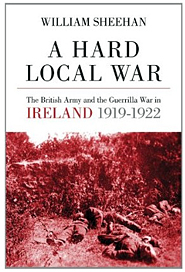|
|
Following
years of discontent over Home Rule and The Easter Rising, the deaths of
two Royal Irish Constabulary policemen in Soloheadbeg at the hands of
the IRA in 1919 signalled the outbreak of war in Ireland. The Irish War
of Independence raged until a truce between the British Army and the
IRA in 1921, historical consensus being that the conflict ended in
military stalemate. In "A Hard Local War", William Sheeham sets out to
prove that no such stalemate existed, and that both sides were
continually innovative and adaptive. Using new research and previously
unpublished archive material, he traces the experience of the British
rank and file, their opinion of their opponents, the special forces
created to fight in the Irish countryside, RAF involvement and the
evolution of IRA reliance on IEDs and terrorism. Using new research and
previously unpublished archive material, including the letters of
British soldiers and IRA men, official reports and period publications,
he also reveals that the British Army was in fact winning the fight in
Cork, partly owing to superior resources, but also because of the
cooperation of the local people. This book successfully challenges the
received wisdom of the events and outcome of the War of Independence,
and sheds new light on a tumultuous period of Irish history.
William
Sheehan is a military historian. He has published five books, British
Voices from the Irish War of Independence (2005), Fighting for Dublin
(2007), Images of Sarsfield Barracks (2008), Hearts and Mines: The
British 5th Division in Ireland 1919-1921 (2009). His doctoral thesis
was published in 2011 under the title, A Hard Local War: The British
Army and the Guerrilla War in Cork 1919-22. He is one of the leading
historians on the Irish War of Independence, and an expert on the
British's army campaign in Ireland from 1919 to 1921.
|
